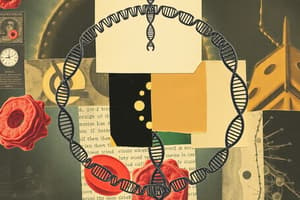Podcast
Questions and Answers
What is the process of separating chromosomes into two identical sets called?
What is the process of separating chromosomes into two identical sets called?
- Interphase
- Mitosis (correct)
- DNA replication
- Cytokinesis
What are the two main phases of the cell cycle in eukaryotic cells?
What are the two main phases of the cell cycle in eukaryotic cells?
- Interphase and cytokinesis
- Interphase and mitotic phase (correct)
- G1 and S
- S and G2
What happens during S phase of interphase?
What happens during S phase of interphase?
- Separation of chromosomes into two identical sets
- DNA replication (correct)
- Mitotic spindle assembly
- Separation of all cell components
What is the quiescent state called that cells can enter?
What is the quiescent state called that cells can enter?
What can errors in mitosis cause?
What can errors in mitosis cause?
What are cyclins and cyclin-dependent kinases (CDKs)?
What are cyclins and cyclin-dependent kinases (CDKs)?
What is the first cyclin produced in cells that enter the cell cycle in response to extracellular signals?
What is the first cyclin produced in cells that enter the cell cycle in response to extracellular signals?
What is the role of checkpoint regulation in an organism's development and sexual reproduction?
What is the role of checkpoint regulation in an organism's development and sexual reproduction?
What is the fluorescent ubiquitination-based cell cycle indicator (FUCCI) used for?
What is the fluorescent ubiquitination-based cell cycle indicator (FUCCI) used for?
What is the accurate process for repairing DNA double-strand breaks?
What is the accurate process for repairing DNA double-strand breaks?
Flashcards are hidden until you start studying
Study Notes
- The cell cycle is a series of events that cause a cell to divide into two daughter cells.
- In eukaryotic cells, the cell cycle is divided into interphase and the mitotic phase.
- Interphase is divided into G1, S, and G2 phases.
- During S phase, DNA replication occurs.
- Mitotic phase consists of mitosis and cytokinesis.
- Mitosis is the process of separating chromosomes into two identical sets.
- Cytokinesis is the separation of all cell components.
- The cell cycle is regulated by cell cycle checkpoints.
- Cells can enter a quiescent state called G0.
- Errors in mitosis can cause mutations that lead to cancer.
- Regulation of the cell cycle is crucial for cell survival and involves detection and repair of genetic damage and prevention of uncontrolled cell division.
- Cyclins and cyclin-dependent kinases (CDKs) are key regulatory molecules that determine a cell's progress through the cell cycle.
- Cyclins form regulatory subunits and CDKs form catalytic subunits of an activated heterodimer.
- Different cyclin-CDK combinations determine the downstream proteins targeted.
- Cyclin D is the first cyclin produced in cells that enter the cell cycle in response to extracellular signals.
- Cyclin D-CDK4/6 complexes mono-phosphorylate the retinoblastoma susceptibility protein (Rb) to pRb, which induces G1/S cell cycle gene expression and progression into S phase.
- Hyperphosphorylated Rb dissociates from the E2F/DP1/Rb complex, activating E2F and resulting in transcription of various genes.
- Cyclin E produced binds to CDK2, forming the cyclin E-CDK2 complex, which pushes the cell from G1 to S phase.
- Mitotic cyclin-CDK complexes promote the initiation of mitosis by stimulating downstream proteins involved in chromosome condensation and mitotic spindle assembly.
- G1 cyclin-CDK activities primarily tune the timing rather than the commitment of cell cycle entry.
- The cell cycle is regulated by cyclin-dependent kinases (CDKs) and cyclins.
- CDKs are activated by binding to cyclins and phosphorylate target proteins.
- The progression of the cell cycle is regulated by inhibitors such as the cip/kip and INK4a/ARF families.
- Synthetic inhibitors of Cdc25 can be used as antineoplastic and anticancer agents.
- Cdk4/6 inhibitors have been developed as a therapeutic target for anti-tumor effectiveness.
- A semi-autonomous transcriptional network works with the CDK-cyclin machinery to regulate the cell cycle.
- Cell cycle checkpoints prevent cell cycle progression until necessary phase processes are completed and DNA damage is repaired.
- Checkpoints include the G1/S checkpoint, G2/M checkpoint, and metaphase checkpoint.
- Mutations that allow cells to speed through checkpoints or skip them altogether can lead to cancer.
- Loss of Rb can lead to primary resistance to Cdk4/6 inhibitors.
- Cells can leave the cell cycle and stay in G0 until their death, removing the need for cellular checkpoints.
- Checkpoint regulation plays an important role in an organism's development and sexual reproduction.
- p53 plays a crucial role in triggering control mechanisms at both G1/S and G2/M checkpoints.
- Fluorescence imaging of the cell cycle is possible with the fluorescent ubiquitination-based cell cycle indicator (FUCCI).
- A disregulation of the cell cycle components may lead to tumor formation.
- The proportion of cells in active cell division in tumors is much higher than in normal tissue.
- The cells actively undergoing cell cycle are targeted in cancer therapy.
- The fastest cycling mammalian cells in culture have a cycle time as short as 9 to 10 hours.
- Cells are most radiosensitive in late M and G2 phases and most resistant in late S phase.
- Homologous recombination is an accurate process for repairing DNA double-strand breaks.
Studying That Suits You
Use AI to generate personalized quizzes and flashcards to suit your learning preferences.




